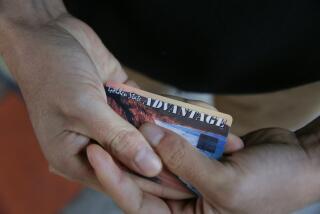‘Dignity Cards’ Replacing Coupons
- Share via
Re “Dignity Means Never Using Doublespeak,” Column Right, Jan. 13: In the late 1970s, my father’s union went on a wildcat strike that lasted a little less than two years. Our family relied on his unemployment payments and food stamps. I can still remember the shame and despair in my father’s eyes. Arianna Huffington is correct in asserting that “it should not be an indignity to ask for help.” However, poverty is a stigma in this society.
Huffington is not correct in her assault on so-called “dignity” cards. There is a deep issue at stake here, one that she tries to obscure by her literary references. (Note the euphemisms she chooses to unmask and those--like “downsizing,” “corporate restructuring” and “welfare reform”--she leaves unexamined.) Somehow, as a society, we believe we have a right to witness the shame of poverty. There is a moral economy of voyeurism at work as we stand in line behind a person paying with food stamps. We get to gawk, shift our feet impatiently, scan and question the items being purchased. If a person has the ability to pay discreetly, the same way I can when using my ATM or credit card, my surveillance ability is gone.
Altering the terms by which we know an idea, a group or an object is a way to begin thinking differently about it. Our objection is not to a person’s use of public assistance; it is to a desire to use it inconspicuously.
MICHELLE LADD
Claremont
More to Read
Sign up for The Wild
We’ll help you find the best places to hike, bike and run, as well as the perfect silent spots for meditation and yoga.
You may occasionally receive promotional content from the Los Angeles Times.






